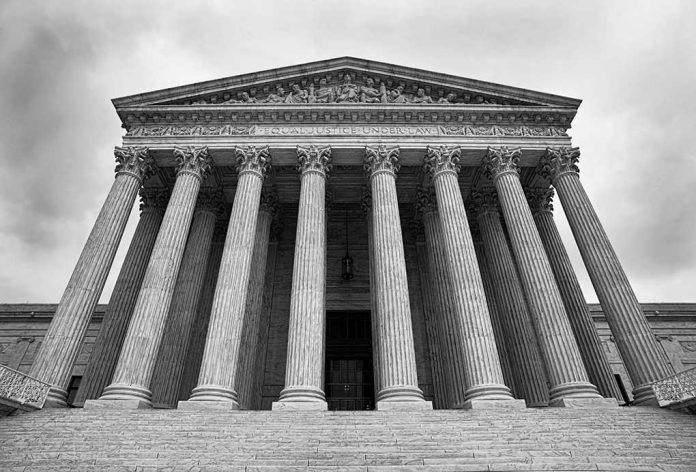
The Supreme Court has handed a unanimous victory to former Chicago alderman Patrick Daley Thompson, overturning his conviction for making false statements to bank regulators based on a crucial legal distinction between “false” and “misleading” communications.
Key Takeaways
- The Supreme Court unanimously overturned Patrick Daley Thompson’s conviction, ruling that the statute only criminalizes “false” statements, not “misleading” ones.
- Thompson, who is related to two former Chicago mayors, was sentenced to four months in prison in 2022 for allegedly lying to the FDIC about loans.
- Chief Justice John Roberts authored the opinion, emphasizing that “a misleading statement can be true, and a true statement is not false.”
- The case stemmed from approximately $219,000 in loans Thompson received from Washington Federal Bank for Savings, which failed in 2017.
- The case has been remanded to the Seventh Circuit Court of Appeals for further proceedings.
Supreme Court’s Unanimous Decision Hinges on Statutory Language
In a significant legal decision, the U.S. Supreme Court has unanimously overturned two convictions against former Chicago Alderman Patrick Daley Thompson. The ruling centered on the interpretation of Section 1014 of Title 18 of the U.S. Code, which criminalizes making false statements to influence certain financial institutions. Chief Justice John Roberts, writing for the Court, established a clear distinction between statements that are false and those that are merely misleading, a difference that proved crucial in Thompson’s case.
Thompson, who is related to two former Chicago mayors – Richard J. Daley and Richard M. Daley – was sentenced to four months in prison in 2022 after a jury convicted him of lying to bank regulators about loans he received from Washington Federal Bank for Savings. The bank failed in 2017 amid an alleged $31 million embezzlement scheme, prompting the FDIC to attempt to collect on Thompson’s outstanding loans totaling approximately $219,000.
Supreme Court Votes 9–0 to Overturn Convictions of Former Chicago Alderman
The Seventh Circuit upheld Patrick Daley Thompson’s convictions for making false statements to the FDIC even though the statements were considered misleading.The Supreme Court on March 21 unanimously… pic.twitter.com/6w8mJTkSN0
— Claire (@ClaireGarcia161) March 22, 2025
The Critical Legal Distinction
The Court’s ruling turned on a precise reading of the statutory language. “False and misleading are two different things. A misleading statement can be true, and a true statement is not false. Given that, it is significant that the statute uses only the word ‘false,’ which means ‘not true.’ Adding ‘any’ before ‘false statement’ does not transform the scope of the statute. A statute that applies to ‘any false statement’ does not cover all misleading statements, only the ‘false’ ones,” wrote Chief Justice Roberts.
To illustrate this distinction, Roberts provided a medical analogy, if a doctor tells a patient he has performed a hundred surgeries without mentioning that 99 patients died, the statement may be technically true but misleading. The Court emphasized that the criminal statute in question does not extend to such misleading but technically true statements.
Case Background and Implications
Thompson’s legal troubles began when he took out loans totaling $219,000 from Washington Federal Bank for Savings in 2011. He made only one payment on these loans before the bank collapsed in 2017. When contacted by the FDIC about an outstanding balance of $269,120.58, Thompson claimed he had only borrowed $110,000. This statement formed the basis for his criminal charges under Section 1014, which prohibits making false statements to influence the actions of the FDIC.
Thompson’s defense had argued that the bank and its former president, John Gembara, were responsible for any erroneous documentation. Gembara was found dead in December 2017, with his death ruled a suicide, shortly before federal regulators shut down the bank. Thompson’s legal team portrayed him as an honest but overwhelmed individual who struggled with tax details while balancing multiple professional roles.
What Happens Next
The Supreme Court has vacated the Seventh Circuit’s decision upholding Thompson’s convictions and remanded the case for further proceedings. The appeals court will now need to reconsider the case in light of the Supreme Court’s clarification on the distinction between false and misleading statements. Thompson had resigned from the Chicago City Council following his conviction in February 2022, and Mayor Lori Lightfoot appointed Nicole Lee to fill his vacant seat.
This ruling could have broader implications for white-collar prosecutions nationwide, as it narrows the scope of what constitutes a criminally false statement under Section 1014. Prosecutors may now face a higher bar when bringing charges based on allegedly false statements to financial institutions, needing to prove statements are actually false rather than merely misleading.
Sources:
Supreme Court tosses convictions on 2 counts for former 11th Ward Ald. Patrick Daley Thompson
Supreme Court Rules for Chicago Politician in Bank Fraud Case
Supreme Court Votes 9-0 To Overturn Convictions Of Former Chicago Aderman



